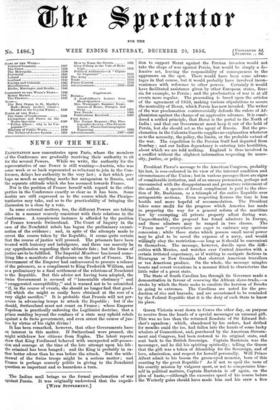President Pierce's message to the American Congress, probably his last,
is rose-coloured in its view of the internal condition and circumstances of the Union; but in various passages there are signs of considers.ble irritation and of an uneasy pretension, perhaps not unconnected with the disappointment and premature retirement of the author. A species of forced compliment is paid to the elec- tion of Mr. Buchanan, as a triumph of the entire Republic over antagonistic sections. Even respecting Kansas the tone is less hostile and more hopeful of accommodation. The President takes some credit for the progress which America has made in preparing the way for a general reform of the maritime law by 'exempting all private property afloat dining war. Unquestionably, the proposal has found admirers in Europe, and those admirers may be ranged in two classes. The "Peace men" everywhere are eager to embrace any specious concession ; while those states which possess small naval power may be glad to be saved the expense of a navy, and would willingly obey the restriction—so long as it should be convenient to themselves. The message, however, dwells upon the diffi- culties with Mexico, and watches over Central America with. a certain irritated expectancy, as if waiting to castigate factions in Nicaragua or New Grenada that obstruct American travellers or tax American produce. On the whole, the message mingles boasts and covert vexations in a manner fitted to characterize the little ruler of a great state.
The State of South Carolina has through its Governor made a demonstration in favour of renewing the African slave-trade,—a stroke by which the State seeks to emulate the heroism of Brooks in going to extremes. The Carolinas are noted for the pro- duction of rice and bravado, and are accustomed to be reminded by the Federal Republic that it is the duty of each State to know its place.
































